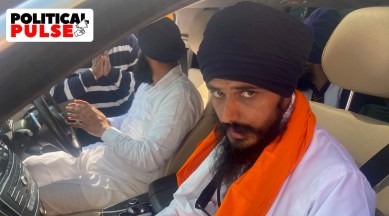Amritpal episode again shows lingering support for Khalistani sentiments abroad, as backing at home dries up
“Concerted attempt to push Punjab back into violence, but fortunately there is no groundswell of support in the state,” says a top police officer.

The high-decibel protests abroad against the Punjab government crackdown on Waris Punjab De chief Amritpal Singh, and their relative absence in the state, once again underline the foreign support that sustains the separatist agenda in Punjab.
The most active protest in Punjab, the blockade of a road in Mohali, paled in front of the singular act of vandalism by pro-Khalistan supporters at the Indian High Commission in London as well as the Indian Consulate in San Francisco, and the strident protests in Canada, apart from the outrage on social media.
Amritpal too made his first forays into the separatist sphere on foreign soil, in Dubai. He was there for 10 years before returning to India in August 2022 to get baptised and start a three-pronged programme – return to a pure form of Sikhism, freedom from drugs, and formation of a separate state.
The Punjabi diaspora has always taken a keen interest in the affairs of the state. When the Aam Aadmi Party first came to the state, it was warmly embraced by Punjabis abroad before it could find acceptance at home. The 2017 elections saw chartered planes from Canada, with many an NRI driving the social media as well as the on-ground campaign of the party. This also gave rise to allegations of party supremo Arvind Kejriwal hobnobbing with radical forces.
It’s no secret that the Khalistan agenda has also been largely kept alive from foreign soil. A top police officer, formerly posted in Punjab, points out how several targeted killings in 2016-17 including that of RSS leader Brig Jagdish Gagneja and earlier of Rashtriya Sikh Sangat president Prof Rulda Singh in 2009 were plotted abroad. In the Rulda Singh case, three British NRIs were held in 2010.
“The commissioning of terrorist violence and secessionist activity, all emanates abroad. There is a concerted attempt to push Punjab back into the vortex of violence, but fortunately there is no groundswell of support in the state as again demonstrated following the recent crackdown,’’ the officer said, adding that Amritpal too had received a lot of foreign backing in terms of paid social media handles and literature.
In his 2021 book Blood for Blood: Fifty Years of the Global Khalistan Project, Canadian journalist Terry Milewski wrote how the Khalistan movement in Canada, the United Kingdom and India has been sustained for decades by Pakistan.
There are outfits in the state that demand more autonomy for Punjab or even separate nationhood, but they do so under the ambit of the Constitution and have not espoused violence. Prof Jagroop Singh Sekhon, a political scientist, says, “We have always had a fringe but it has existed peacefully with the mainstream and performs a function of democracy.”
Sekhon points out how most people in the Punjab countryside have not heard of the Khalistan referendum, a brainchild of Gurpatwant Singh Pannu, an American lawyer and founder of Sikhs for Justice (SFJ). “Pannu, who claims to be striving for Khalistan, has no support here in Punjab, he draws it from the diaspora. Which is why the first referendum was held in London and then in Canada.’’
Experts attribute this support to the search for identity. Prof Manjit Singh from Panjab University says the generation that migrated to the West in the 1980s was quick to attain financial independence but it could never assimilate into the foreign culture. “They wanted to belong, so it led to a mushrooming of gurdwaras, which at times got hijacked by weekend Khalistanis. So, they are always part of some movement or the other related to Punjab. It could be for a stronger Punjab or for a separate Khalistan. It’s here that they find a sense of purpose and identity.’’
Ashutosh Kumar, a political scientist at Panjab University, says the Punjabis in the state are more pragmatic. “They have suffered the fallout of militancy. Even drugs are its byproduct. That is why you see little support for wannabe ideologues like Amritpal. People don’t want a return to violence.’’
Agreeing with this, a former officer with the Punjab Police says this is the reason that the huge cache of weapons sent by Pakistan have been largely unused. “From hand grenades and tiffin bombs to IEDs, we recovered a lot of weaponry in 2021. I believe the drops have only got bigger but we have not seen these weapons being used in Punjab. That shows there is no support for violence or a separatist agenda on the ground.’’